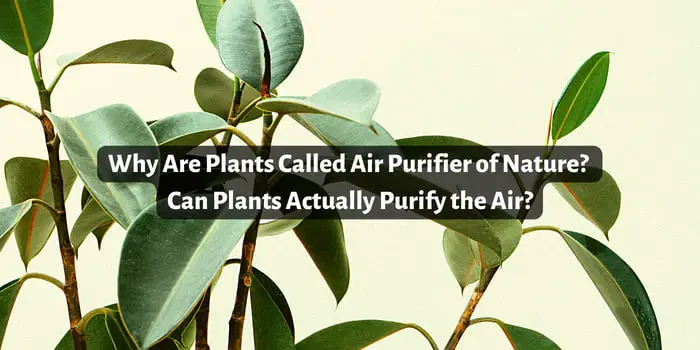Last Updated on August 24, 2025
If you have recently thought about getting an air purifier at your home, you might have been suggested to get indoor plants instead. Well, plants are indeed beneficial for the environment. Whether they are rooted outside, or you have them in a pot indoors, they can enhance the quality of the surroundings.
However, why are plants called air purifier of nature? The scientific answer to that would be the photosynthesis process. Through this, plants take in carbon dioxide that humans breathe out. And as a byproduct, the green friends will make the air around you fill up with oxygen.
But there is more to the discussion you need to understand to get to the bottom of the topic. So, continue reading!
How Can Plants Purify the Air Around You?
Plants mainly purify the air around you through the photosynthesis process. In this process, plants will take in carbon dioxide, which humans breathe out, light, and water to create simple sugar. This sugar is what the plants survive on. And throughout the process, they will create oxygen as a byproduct.
In short, the plants will increase the amount of oxygen around you. That is what makes these natural air purifiers different from machine air purifiers. No matter how advanced the air purification device is, it will not be capable of creating oxygen. And without the right oxygen level, the air around you will not be ideal.
Now, you might be wondering if plants can eliminate the pollutants in the air or not. Yes, they can! They do that through the phytoremediation process. In that, the plants will mitigate the level of pollutants that are present in the air, water, or soil. That is why different studies have recommended having indoor plants in your home.
According to one of the studies, plants can even absorb many other harmful gases that are found in the air. They can even clear out an extensive list of volatile substances that usually floats around the air.
For example, benzene, an element in fabrics, plastics, pesticides, and cigarette smoke, is in high amounts in areas. This gas can eventually make its way to indoor environments, which can deteriorate the health conditions of humans.
Different studies have also found that plants can eliminate formaldehyde, which is found in fabric softeners, dish detergents, and carpet cleaners.
Transpiration and Stomata Process of Plants
Indoor plants have the ability to accelerate the process of transpiration, in which the water vapor and phytochemicals are cleared out to create a movement in the air. In this process, plants will circulate the air and pull airborne toxins into their leaves and roots.
After the transpiration process, plants will initiate the stomata process. In this process, plants will absorb the pollutants that are in the air. And they will do that through the microscopic openings that are on their leaves.
Studies from NASA indicated that plant-filled rooms could contain 50 to 60 percent fewer airborne bacteria and molds. In other words, when there are plants in an indoor room, the environment around it will be healthier than the outside.
Other Benefits of Having Plants in Your Room
It is quite clear at this point that plants can create a cleaner and healthier indoor environment. But aside from that, studies have proved that it can help with concentration and productivity. NBC News stated that plants could even lower the stress level and boost the overall mood if you have them indoors.
So, you will not be just creating a healthy and clean air quality after getting indoor plants for your room. You can also enhance your workflow and have better mental health after having them.
Final Words
So, why are plants called air purifier of nature? The main reason is the photosynthesis process that plants initiate when creating food for themselves. They will increase the oxygen level and lower the carbon dioxide level. Along with that, plants can reduce pollutants in the air through transpiration and stomata processes.
